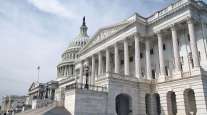Senior Reporter
Senators Pursue Highway Trust Fund Rescue

[Stay on top of transportation news: Get TTNews in your inbox.]
WASHINGTON — A federal highway account at the center of the transportation funding debate on Capitol Hill would receive a lifeline under a new bipartisan proposal in the U.S. Senate.
Sens. Mitt Romney (R-Utah) and Joe Manchin (D-W.Va.) are leading an effort to create panels that would be tasked with guaranteeing the long-term viability of potentially inoperative trust funds.

Romney
The proposal would aim to establish congressional panels to recommend a plan for restoring specific trust funds. The panel’s plan would be prioritized for consideration in both chambers.
The Treasury Department would inform Congress which funds are deemed “endangered,” and worthy of the new “rescue” committee’s attention.
A recent report by the Congressional Budget Office determined the Highway Trust Fund will be exhausted by 2022 without additional revenue or reductions in spending. That would qualify the Highway Trust Fund for such a rescue committee.
Besides the Highway Trust Fund, the measure would likely address trust funds related to Medicare Hospital Insurance, Social Security Disability Insurance and Social Security Old-Age and Survivors Insurance.
“We have a duty to work to secure these programs that provide a safety net for millions of Americans,” said Romney, in a statement last month.

Manchin
Added Manchin: “Unfortunately our fiscal irresponsibility has left critical programs like Social Security and Medicare heading toward insolvency. Congress cannot let these programs fail.”
The bipartisan Senate measure was unveiled shortly before a senior transportation policymaker again urged fellow senators to advance the multiyear update of a 2015 highway law.
Delaware Sen. Tom Carper, the top Democrat on the surface transportation committee, warned that comprehensive highway policy legislation his panel advanced during the summer would languish in the chamber absent the contributions from the committees responsible for the Highway Trust Fund, freight transportation and public transit.
Carper told reporters Nov. 6 that he hopes fellow transportation authorizers proceed with the reauthorization measure, adding the bill “has a lot in it that they want and need.”
“Our bill is going to go nowhere unless the Banking [Housing, and Urban Affairs] Committee does their work, Commerce [Science, and Transportation] committee does their work, the Finance Committee does their work,” said Carper, ranking member of the Environment and Public Works Committee. “And, so, I just want to remind them all that they have a dog in this fight. And their committees need to act. It’s not my job to tell them how to do their work, but to let them know how important it is that they do.”
The Republican chairmen of the three committees Carper referenced have not scheduled hearings to take up their aspects of the highway reauthorization bill.
The current FAST Act highway law’s authority expires in the fall of 2020, and the bill advanced out of Carper’s committee proposes a five-year, $287 billion reauthorization for surface transportation. The measure stops short of fully updating policy related to commercial transportation and public transit systems.
Also, the Highway Trust Fund’s looming insolvency is a matter that falls under the Finance Committee’s jurisdiction. The fund assists states with construction and maintenance projects.
Identifying a sustainable source of funding for highway programs continues to challenge federal lawmakers, emphasized Carper. The trust fund relies on insufficient revenue from the federal tax on gas (18.4 cents per gallon) and diesel (24.4 cents per gallon). That rate was set in 1993.
“The toughest part on transportation infrastructure is always how do we pay for this,” Carper said. “I’m suggesting to people different ideas and asking them to think; consider those ideas sort of as a menu and try to stimulate their thoughts, and coming up with even better ideas.”
That will probably come last, he added. “The other committees, I think, would do well to follow our example and work together in a bipartisan way; come up with a lot of their own pieces of transportation and be ready for Finance [Committee] to do its job.”
Carper said of the status of the legislative collaboration between Congress and the White House amid impeachment proceedings, the administration and President Donald Trump are “having difficulty” focusing on some of these issues.
“I’ve been in meetings — I think three meetings earlier this year in the White House where [Trump] participated — one case, he walked out. I know he has a huge interest in this. But we’ve not heard much at all from — nothing from him and not much at all from his Secretary of Transportation,” added Carper. “So that would suggest to me that their thoughts are elsewhere.”
Trump and top White House officials have criticized Democratic lawmakers for proceeding with an impeachment instead of pursuing macro policy matters, such as a long-term infrastructure funding measure.
House Transportation and Infrastructure Committee Chairman Peter DeFazio (D-Ore.) said he intends to consider his highway reauthorization version as early as the start of next year.
Want more news? Listen to today's daily briefing:




